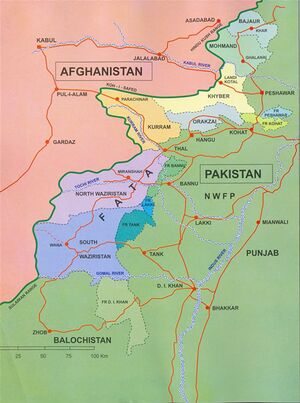Orakzai
| Author:Laxman Burdak, IFS (R) |

Orakzai (Pashto: اورکزی Hindi:ओरकजई) or Aurakzai[1] (औरकज़ई) is a Pashtun tribe settled in the Orakzai Agency of Pakistan. Most of the members are situated in the North West Frontier Province of Pakistan. It is Arasakoi of Herodotus.
Origin
The Orakzai tribes take their name, which literally means the lost son (Wrak Zoi), from a romantic legend about their ancestor, Sikandar Shah who was a prince from Iran. He was exiled or lost, and after many adventures he married and settled in Tirah.[2]One branch, the Ali Khel, has been traced to Swat, whence they were expelled by the other inhabitants and it is not improbable that the whole tribe consists of refugee clans of the surrounding races. They cultivate a good deal of the Khanki and Kurmana valleys in the winter, but in the hot months retire to the heights of Tirah, of which they occupy the southern half called the Mastura Valley.
Divisions of Orakzai
The Orakzais are usually considered to be divided into six main clans, the Ismailzai, Lashkarzai, Massuzai, Daulatzai, Muhammad Khel, and Sturi Khel (or Alizai); and four hamsaya clans, the Ali Khel, Malla Khel, Mishti Khel and Sheikhans.
The expedition of Alexander against the Arasakoi
An Inquiry Into the Ethnography of Afghanistan By H. W. Bellew tells us about The expedition against the Arasakoi (Orakzi), I may here observe, must have been conducted by Kraterus. For Alexander, as Arrian continues, next directed his march towards the river Euaspla (the same apparently as the Khoaspes of Strabo ; by crossing the Kabul river at the ford between Daka and Lalpura,
[Page-67]: and thence marching over the Goshta plain), where the general of the Aspioi lay, and in two days' time by long journeys came to the city (not named ; perhaps Gandhar in Nawagai), which on his approach the Barbarians set on fire, and fled to the mountains. The Makedonians pursued and make great slaughter of them before they could reach those rugged and almost inaccessible places of retreat. Alexander then passed one of these mountains and came to the city of Arigaius (perhaps the Total range, to the city of Arichand where are extensive ruins round about the existing village of that name, at the eastern base of the range, in the Ranrizi district of Yusufzi), and found it deserted and burnt by the inhabitants. Alexander considered the situation of this place extremely commodious, and Kraterus having in the meantime rejoined him, he ordered him to rebuild the city and people it with such of the neighbouring inhabitants as would voluntarily come, and with others out of the army who were unfit for further service. In the meantime Alexander directed his march (along the skirt of the Totai and Malakand hills perhaps) to the place where the Barbarians had fled (perhaps the Mora mountain and pass of that name into Swat), and encamped at the foot of a certain mountain (probably Malakand, or perhaps Pajah), where, learning that many more fires appeared in the camp of the Barbarians than in his own, he moved forwards with a strong force to attack them, and after a sharp conflict on the plain and the hill occupied by the enemy, they were defeated with the loss of forty thousand men taken, and two hundred and thirty thousand head of cattle.
Religion
The Orakzai's are mostly Muslims from both major sects Sunni and Shia. There are some Sikhs also living along with Orakzai, but they are said to be originally Afridis.
Notable persons
- Dost Muhammad Khan (1672–1728) - The Orakzais served in the Mughal army. The Bhopal State of India was established by Dost Muhammad Khan, an Orakzai commander in the Mughal army. His descendants, the Nawabs of Bhopal, were of Orakzai ancestry.[3]
References
- ↑ A glossary of the Tribes and Castes of the Punjab and North-West Frontier Province By H.A. Rose Vol II/A, p.25
- ↑ "Census of India, 1901, Volume 17, Part 1" by India Census Commissioner, Edward Albert Gait. Published by the Office of the Superintendent of Government Printing, India, 1902. Pg 149.
- ↑ Shaharyar M. Khan (2000). The Begums of Bhopal: A History of the Princely State of Bhopal. I.B.Tauris. p. 119. ISBN 978-1-86064-528-0.
Back to Jat Places in Pakistan

